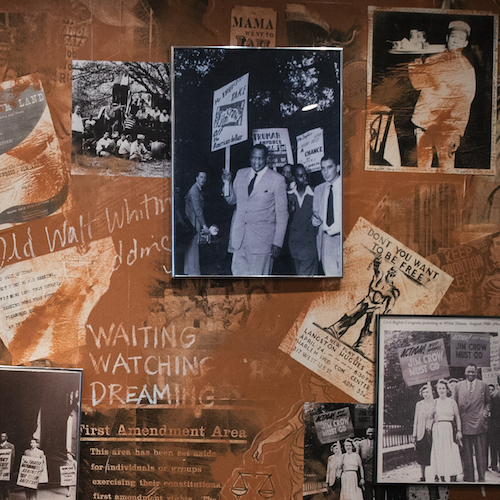

Busboys and Poets 14th & V welcomes authors Emily J. Lordi and Tony Fletcher to speak about their books "Donny Hathaway Live" from the 33 1/3 collection and "In the Midnight Hour: The Life and Soul of Wilson Pickett."
With live music by members of former Pickett backing band the Midnight Movers.

In January of 1979, the great soul artist Donny Hathaway fell fifteen stories from a window of Manhattan's Essex House Hotel in an alleged suicide. He was 33 years old and everyone he worked with called him a genius. Best known for “A Song for You,” “This Christmas,” and classic duets with Roberta Flack, Hathaway was a composer, pianist, and singer committed to exploring “music in its totality.” His velvet melisma and vibrant sincerity set him apart from other soul men of his era while influencing generations of singers and fans whose love affair with him continues to this day.
The first nonfiction book about Hathaway, Donny Hathaway Live uses original interviews, archival material, musical analysis, cultural history, and poetry to tell the story of Hathaway's life, from his beginnings as a gospel wonder child to his final years. But its focus is the brutally honest, daringly gorgeous music he created as he raced the clock of mental illness-especially in the performances captured on his 1972 album Donny Hathaway Live. That album testifies to Hathaway's uncanny ability to amplify the power and beauty of his songs in the moment of live performance. By exploring that album, we see how he generated a spiritual experience for those present at his shows, and for those with the privilege to listen in now.
Emily J. Lordi is a writer, professor, and cultural critic. She's written two books: one on black women singers and African American writers (Black Resonance) and one on the classic soul album Donny Hathaway Live. She's also published scholarly articles on topics ranging from literary modernism to neosoul music, as well as music and book reviews for sites like Slate, The Root, The Fader, and the Los Angeles Review of Books.

He was the Wicked Wilson Pickett, the legendary soul man whose forty-plus hits included "In the Midnight Hour," "634-5789," "Land of 1000 Dances," "Mustang Sally," and "Don't Let the Green Grass Fool You." Remarkably handsome and with the charisma to match, Wilson Pickett was considered by many to be the greatest, the most visceral and sensual of the classic 1960s soul singers, and as a man who turned screaming into an art form, the most forceful of them all. He was the living embodiment of soul.
More than that, Wilson Pickett's journey reads like a guide to popular black American music in the late 20th century. From the gospel-rich cotton fields of Alabama to the pre-Motown metropolis of Detroit, and throughout his career at Atlantic Records--he was the first artist on that label to record at Stax in Memphis, Fame in Muscle Shoals, and Sigma in Philadelphia, and rehabilitated an exiled Bobby Womack and introduced Duane Allman along the way--Wilson Pickett led the shifts in Rhythm and Blues and soul music.
Pickett's downfall, precipitated by the move towards softer soul and then disco in the 1970s, proved equally dramatic, leading to a heavy alcohol and drug addiction, a reputation for violence and gun use, a no-show for his induction into the Rock 'n' Roll Hall of Fame in 1991, and two jail terms later in the decade. Nonetheless, the "Wicked" Pickett climbed out of these depths to end his career with a Grammy-nominated album before his death in 2006.
For this first-ever accounting of Wilson Pickett's life, bestselling biographer Tony Fletcher interviewed members of the singer's family, friends and partners, along with dozens of his studio and touring musicians. Offering equal attention to Pickett's personal and professional life, with detailed insight into his legendary studio sessions and his combative road style, In the Midnight Hour: The Life and Soul of Wilson Pickett is the essential telling of an epic life.